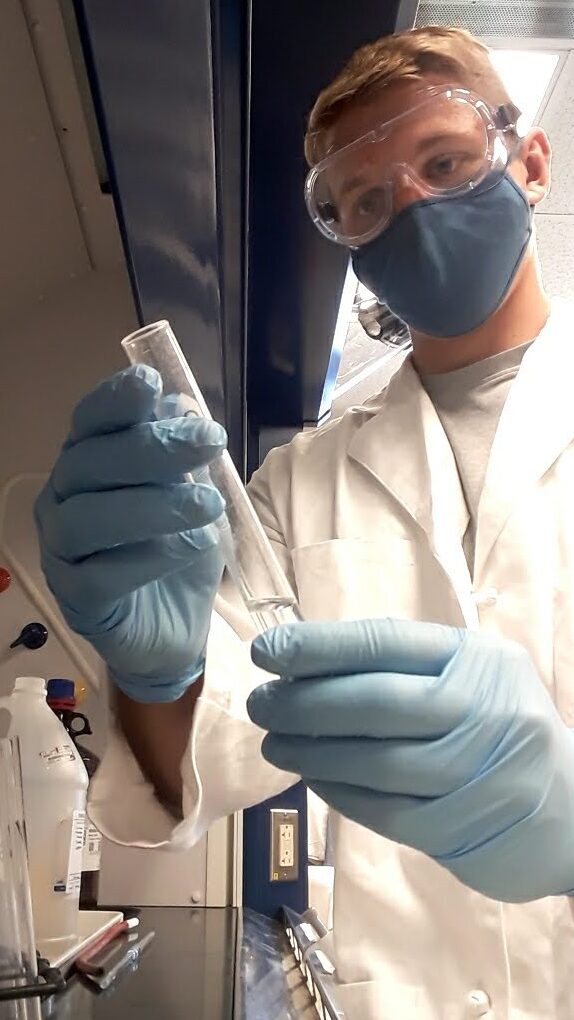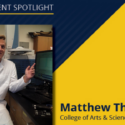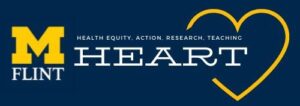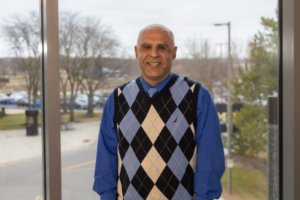Matthew Thelen likes to get right to the root of a problem. And as a molecular biology major, that shouldn’t come as a surprise. Why deal with things on the surface when the truth lies beneath? It’s that curiosity to reveal the origin of an issue that has led the junior from Metamora to pursue his passion for problem solving at the University of Michigan-Flint
“I’ve been interested in diseases that are difficult to treat and involve the nervous system and believe there’s a lot yet to be done in treating the root of a problem instead of just treating symptoms,” said Thelen. As a result of that interest, he quickly got involved with undergraduate research when he arrived on campus three years ago.
In the winter 2021 semester, Thelen signed up for an Undergraduate Research Opportunity Program internship (Curious? Click here!) with a multidisciplinary project that seeks to create a mobile application to measure indicators of Parkinson’s Disease symptoms. He participated in many of the project’s interviews, assisted heavily in data analysis and will be presenting the work at the International Mechanical Engineering Congress & Exposition this Fall in Columbus. Thelen has been integral in conducting the user-centered design study for the app, working directly with Charlotte Tang, associate professor of computer science and the human computer interaction lead on the project.
The first part of the experiment, according to Thelen, is really to find out if smartphones are capable of measuring the things we want them to measure. Thelen says, “Nathaniel Miller, (associate professor of psychology), had data from years ago on a study he did with postural stability. We wanted to compare the parameters of that to see if a smartphone was able to pick up a tremor or postural instability.” Assistant Professor of Engineering Linda Zhu directed this part of the research, he said.
Thelen has been really involved in the user centered design study for the app. He said, in designing an application like this, there are multiple users you have to design for. Thelen said he spent a lot of time interviewing persons with Parkinson’s Disease, and Healthcare Providers as the two main users to consider for the design. Through these interviews, the team revealed that PwPD really would like to be able to use a tool like this as long as it is easy to use. PwPD also indicated a desire for more education and connectedness to their specialists as well. HCPs said that the application would improve the reliability of their data with tracking, possibility of early regression detection, and ability to link with medical records to help with a better understanding of the disease. Thelen is working with Tang in response to the HCPs to integrate communication between HCPs to coordinate data from the application. “Parkinson’s is especially difficult because each patient is actually unique in the symptoms they have,” Thelen said, “one patient could have severe tremors, but another presents with cognition or speech problems, or gait instability, and that’s what’s really interesting about Parkinson’s.”
“That experience was really great, because I got to learn something new outside of my area of study,” said Thelen. That didn’t stop him from getting involved with research closer to his own discipline the next semester.

In Spring 2021, Thelen signed on with Associate Professor of Analytical Chemistry, Dr. Matthew Fhaner, for a research project aimed at finding new ways to to monitor the quality of cooking oils. In America, we use an incredible amount of Omega 3/6 fatty acids to cook our food, but the methods currently used for measuring them require off-site testing, with on-site methods lacking adaptability to different oils and lack specificity. In response to prior research indicating that common cooking oils produce unique voltammetric traces based on their lipid profiles, Dr. Fhaner guided Thelen in creating some experiments to see what they could uncover.
Thelen’s experiment started out looking at whether we can know the concentration and type of healthy fatty acids in an oil from a simple test. “Right now,” Thelen continues, “we’re working on an oil heating experiment, where we have cooking oils and heat them in an oven over a long period of time and pull samples every couple of hours. We ran gas chromatograph mass spectrometry, IR, and Square Wave Voltammetry tests to see if we could pick up how they were changing over time.” We use these oils every day, but they break down and oxidize with heat. “Once they break down, they can become any number of harmful things like free radicals.” The project aims to find a reliable, cheaper way to monitor the quality of these cooking oils, enabling more-frequent monitoring in our food systems, leading to better communal health.
“This is literally the most valuable experience, for me, in my undergraduate career,” Thelen says. He really couldn’t say enough about how his mentors in both projects supported him with their patience and readiness to answer any questions he had. “Not only are they awesome people to work with, I’m just grateful that, while they’re doing this work, they’re able to get students like me involved.”
“Matt (Thelen) may not realize it, but working with students like him is not just beneficial for him, but it is also extremely beneficial for myself. Sharing my experience as a scientist and helping to develop the critical thinking skills of our students genuinely brings me joy. It forces me to become a better communicator so that I can relate scientific theory to the students in an understandable way, especially for students outside my core area such as Thelen. Additionally, the students help me develop new ideas to test and we get the shared benefit of presenting and publishing the results. Every student that works with me for more than a year is guaranteed to have a presentation or publication on their resume which helps the students stand out in their job or professional-school search and helps my research stay current in the field.”
Matthew Fhaner, associate professor of analytical chemistry
In addition to learning how to use complex scientific instruments and quantitative data analysis, Thelen points to learning how to design experiments as crucial for his future in the sciences. “I’ll be in the lab,” Thelen elaborates, “and Dr. Fhaner will say, ‘come up with an experiment plan for this. Talk to me about it, and we’ll run it.’ It’s been a good experience with how to be a better scientist and has the added coolness of possibly improving the quality of the things we eat.” As Thelen looks forward to his goals of future research and Med school, he feels the research experience he’s gained at UM-Flint has especially well prepared him for his next steps.
To learn more about UM-Flint’s Undergraduate Research Opportunity Program, visit the program’s webpage. To learn more about the university’s biology programs, visit the College of Arts and Sciences webpage.
A portion of this article was released on UM-Flint NOW News & Happenings on August 8, 2022.





